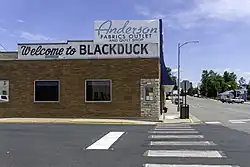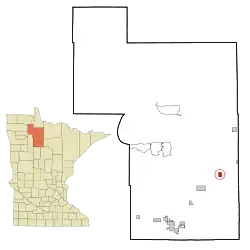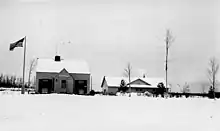Blackduck, Minnesota
Blackduck is a city in Beltrami County, Minnesota, United States. The population was 845 as of the 2020 census.[3] It is 24 mi (39 km) northeast of Bemidji.
Blackduck | |
|---|---|
 Downtown Blackduck | |
| Motto: "A Great Place For Families"[1] | |
 Location of Blackduck, Minnesota | |
| Coordinates: 47°43′49″N 94°32′52″W | |
| Country | United States |
| State | Minnesota |
| County | Beltrami |
| Incorporated (village) | October 19, 1900 |
| Incorporated (city) | December 21, 1900 |
| Government | |
| • Mayor | Max Gulette |
| Area | |
| • Total | 1.59 sq mi (4.13 km2) |
| • Land | 1.55 sq mi (4.02 km2) |
| • Water | 0.04 sq mi (0.10 km2) |
| Elevation | 1,398 ft (426 m) |
| Population | |
| • Total | 845 |
| • Estimate (2021)[4] | 833 |
| • Density | 543.76/sq mi (209.94/km2) |
| Time zone | UTC-6 (CST) |
| • Summer (DST) | UTC-5 (CDT) |
| ZIP codes | 56630, 56663 |
| Area code | 218 |
| FIPS code | 27-06256[5] |
| GNIS feature ID | 0655419[6] |
| Website | blackduckmn.com |
History
The village of Blackduck was organized on October 19, 1900, and the city was incorporated on December 21, 1900.[7] The first settlers came from Crookston, Minnesota. The town was founded because of the area's logging potential. The Continental Divide is near the area, and provides good drainage, resulting in good logging because the land is not wet. The community was named for Blackduck Lake.[8]
Geography
According to the United States Census Bureau, the city has an area of 1.71 square miles (4.43 km2), of which 1.67 square miles (4.33 km2) is land and 0.04 square miles (0.10 km2) is water.[9]
Climate
| Climate data for Blackduck, Minnesota, 1991–2020 normals, extremes 1989–2019 | |||||||||||||
|---|---|---|---|---|---|---|---|---|---|---|---|---|---|
| Month | Jan | Feb | Mar | Apr | May | Jun | Jul | Aug | Sep | Oct | Nov | Dec | Year |
| Record high °F (°C) | 52 (11) |
62 (17) |
71 (22) |
88 (31) |
90 (32) |
90 (32) |
95 (35) |
94 (34) |
89 (32) |
85 (29) |
69 (21) |
51 (11) |
95 (35) |
| Average high °F (°C) | 18.0 (−7.8) |
23.7 (−4.6) |
36.9 (2.7) |
51.7 (10.9) |
64.7 (18.2) |
73.7 (23.2) |
78.3 (25.7) |
76.8 (24.9) |
67.6 (19.8) |
52.9 (11.6) |
36.4 (2.4) |
23.3 (−4.8) |
50.3 (10.2) |
| Daily mean °F (°C) | 4.7 (−15.2) |
9.6 (−12.4) |
23.2 (−4.9) |
38.1 (3.4) |
51.4 (10.8) |
61.3 (16.3) |
65.9 (18.8) |
63.9 (17.7) |
54.8 (12.7) |
41.7 (5.4) |
26.1 (−3.3) |
12.0 (−11.1) |
37.7 (3.2) |
| Average low °F (°C) | −8.7 (−22.6) |
−4.5 (−20.3) |
9.5 (−12.5) |
24.6 (−4.1) |
38.1 (3.4) |
48.9 (9.4) |
53.5 (11.9) |
50.9 (10.5) |
42.1 (5.6) |
30.5 (−0.8) |
15.9 (−8.9) |
0.7 (−17.4) |
25.1 (−3.8) |
| Record low °F (°C) | −45 (−43) |
−44 (−42) |
−35 (−37) |
−20 (−29) |
20 (−7) |
30 (−1) |
37 (3) |
27 (−3) |
16 (−9) |
7 (−14) |
−28 (−33) |
−38 (−39) |
−45 (−43) |
| Average precipitation inches (mm) | 0.18 (4.6) |
0.37 (9.4) |
0.65 (17) |
1.16 (29) |
2.91 (74) |
4.30 (109) |
3.26 (83) |
2.80 (71) |
2.84 (72) |
2.69 (68) |
0.78 (20) |
0.31 (7.9) |
22.25 (564.9) |
| Average snowfall inches (cm) | 9.1 (23) |
10.1 (26) |
7.4 (19) |
7.1 (18) |
0.1 (0.25) |
0.0 (0.0) |
0.0 (0.0) |
0.0 (0.0) |
0.0 (0.0) |
1.5 (3.8) |
6.9 (18) |
13.1 (33) |
55.3 (141.05) |
| Average extreme snow depth inches (cm) | 13.9 (35) |
16.1 (41) |
12.8 (33) |
5.3 (13) |
0.1 (0.25) |
0.0 (0.0) |
0.0 (0.0) |
0.0 (0.0) |
0.0 (0.0) |
1.1 (2.8) |
3.7 (9.4) |
11.5 (29) |
19.6 (50) |
| Average precipitation days (≥ 0.01 in) | 1.8 | 1.8 | 2.5 | 3.5 | 7.9 | 9.3 | 7.6 | 6.5 | 6.6 | 5.8 | 3.0 | 1.8 | 58.1 |
| Average snowy days (≥ 0.1 in) | 6.9 | 5.9 | 3.9 | 2.8 | 0.1 | 0.0 | 0.0 | 0.0 | 0.0 | 1.0 | 4.6 | 7.1 | 32.3 |
| Source 1: NOAA[10] | |||||||||||||
| Source 2: XMACIS2 (precip/precip days, snow/snow days/snow depth 1990–2019)[11] | |||||||||||||
Demographics
| Census | Pop. | Note | %± |
|---|---|---|---|
| 1910 | 942 | — | |
| 1920 | 788 | −16.3% | |
| 1930 | 704 | −10.7% | |
| 1940 | 753 | 7.0% | |
| 1950 | 732 | −2.8% | |
| 1960 | 765 | 4.5% | |
| 1970 | 595 | −22.2% | |
| 1980 | 653 | 9.7% | |
| 1990 | 718 | 10.0% | |
| 2000 | 696 | −3.1% | |
| 2010 | 785 | 12.8% | |
| 2020 | 845 | 7.6% | |
| 2021 (est.) | 833 | [4] | −1.4% |
| U.S. Decennial Census[12] 2020 Census[3] | |||
2010 census
As of the census of 2010, there were 785 people, 338 households, and 185 families living in the city. The population density was 470.1 inhabitants per square mile (181.5/km2). There were 372 housing units at an average density of 222.8 per square mile (86.0/km2). The racial makeup of the city was 89.4% White, 0.4% African American, 4.6% Native American, 0.5% Asian, 0.1% Pacific Islander, 0.8% from other races, and 4.2% from two or more races. Hispanic or Latino of any race were 2.0% of the population.
There were 338 households, of which 32.8% had children under the age of 18 living with them, 33.1% were married couples living together, 16.9% had a female householder with no husband present, 4.7% had a male householder with no wife present, and 45.3% were non-families. 41.1% of all households were made up of individuals, and 22.1% had someone living alone who was 65 years of age or older. The average household size was 2.22 and the average family size was 2.97.
The median age in the city was 37.1 years. 27.1% of residents were under the age of 18; 9.3% were between the ages of 18 and 24; 23.1% were from 25 to 44; 19.6% were from 45 to 64; and 20.9% were 65 years of age or older. The gender makeup of the city was 45.9% male and 54.1% female.
2000 census
As of the census of 2000, there were 696 people, 304 households, and 175 families living in the city. The population density was 465.8 inhabitants per square mile (179.8/km2). There were 324 housing units at an average density of 216.8 per square mile (83.7/km2). The racial makeup of the city was 92.10% White, 0.86% African American, 3.45% Native American, 0.14% Asian, 0.14% from other races, and 3.30% from two or more races. Hispanic or Latino of any race were 0.72% of the population.
There were 304 households, out of which 26.0% had children under the age of 18 living with them, 40.1% were married couples living together, 14.5% had a female householder with no husband present, and 42.4% were non-families. 37.8% of all households were made up of individuals, and 19.7% had someone living alone who was 65 years of age or older. The average household size was 2.14 and the average family size was 2.81.
In the city the population was spread out, with 24.6% under the age of 18, 9.1% from 18 to 24, 22.0% from 25 to 44, 15.8% from 45 to 64, and 28.6% who were 65 years of age or older. The median age was 40 years. For every 100 females there were 68.9 males. For every 100 females age 18 and over, there were 64.1 males.
The median income for a household in the city was $21,848, and the median income for a family was $29,750. Males had a median income of $28,594 versus $16,838 for females. The per capita income for the city was $12,536. About 11.6% of families and 16.9% of the population were below the poverty line, including 18.5% of those under age 18 and 15.8% of those age 65 or over.
Parks and recreation

The Blue Ox Trail goes through Blackduck for use by hikers and snowmobilers. The old rail line includes the Minnesota and International Railway Bridge, which is on the National Register of Historic Places.[13]
Education
Blackduck has one public school, which houses Blackduck Elementary School and Blackduck High School.[14]
References
- "City of Blackduck Minnesota". City of Blackduck Minnesota. Retrieved October 14, 2012.
- "2020 U.S. Gazetteer Files". United States Census Bureau. Retrieved July 24, 2022.
- "Explore Census Data". United States Census Bureau. Retrieved August 21, 2022.
- "City and Town Population Totals: 2020-2021". United States Census Bureau. August 21, 2022. Retrieved August 21, 2022.
- "U.S. Census website". United States Census Bureau. Retrieved January 31, 2008.
- "US Board on Geographic Names". United States Geological Survey. October 25, 2007. Retrieved January 31, 2008.
- "Area History". Blackduck Area History & Art Center. Retrieved October 14, 2012.
- "Profile for Blackduck, Minnesota, MN". ePodunk. Retrieved October 14, 2012.
- "US Gazetteer files 2010". United States Census Bureau. Archived from the original on January 25, 2012. Retrieved November 13, 2012.
- "U.S. Climate Normals Quick Access – Station: Blackduck, MN". National Oceanic and Atmospheric Administration. Retrieved February 24, 2023.
- "xmACIS2". National Oceanic and Atmospheric Administration. Retrieved February 24, 2023.
- "Census of Population and Housing". Census.gov. Retrieved June 4, 2015.
- Kellner, Debra (March 2013). "National Register of Historic Places Registration Form: Minnesota and International Railway Trestle at Blackduck" (PDF). National Park Service. Archived (PDF) from the original on January 31, 2017. Retrieved January 26, 2017.
- "Home". blackduck.k12.mn.us. Archived from the original on April 16, 2009. Retrieved January 12, 2022.
- "Welcome to the Blackduck American Web site!". Bemidji Pioneer. April 9, 2008. Retrieved March 3, 2022.
